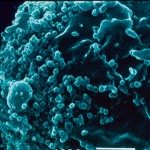Link to Pubmed [PMID] – 9325488
Am. J. Reprod. Immunol. 1997 Sep;38(3):168-75
Allopregnancy induces specific transient tolerance to paternal grafts, and we know that a low molecular weight material (“filtrate”) present in a human placental supernatant can do so in vitro (specific unresponsiveness) as well as in vivo, such as when preventing graft-versus-host reaction (GVH) produced by A cells injected into irradiated A x B F1s recipient. We also know by studies carried out using specific anti-V beta-specific stimulation as well as secondary and primary mixed lymphocyte reaction in major histocompatibility complex (MHC) only incompatible combinations that the material acts by inducing T cell anergy rather than clonal deletion. We explored the mechanism of such an anergy, which we know was not dependent on calcium fluxes, cyclic adenosine monophosphate (cAMP) levels, or PkC by studies of protein phosphorylation. Having observed in previous studies that expression of T cell reactivity (TcR) in anergic cells was enhanced, but that the numbers of cells expressing a given reactivity (TcR) V beta after specific stimulation in the presence of a filtrate was much higher than it should be, we monitored the receptor expression by fluorescence-activated cell sorter (FACS).

